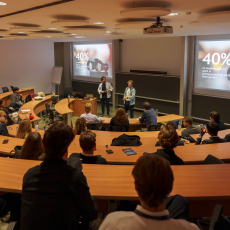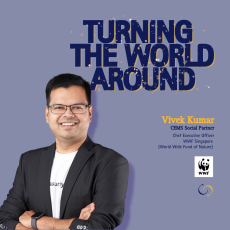The misconception of digital transformation
Most of the time people believe that digital transformation has a positive impact on the environment, by using online readers and magazines, reducing the consumption of paper and therefore wood. But that's where we are wrong:
Digital technologies account for around 4% of global carbon emissions, thus making digitalization the 6th largest polluter worldwide.
Most of the pollution from digital technologies stems from the widespread use of digital technologies, cloud services, and energy-intensive data centers. As we use our computers and smartphones 24/7, we leave a considerable ecological footprint behind (Digital for the Planet, 2018). Obviously, we cannot go back and eradicate digitalization but rather we need to learn how to use and work with it in a sustainable way. Let us consider how we as future leaders should start to rethink our daily digital habits and actively contribute to reducing the global footprint.
The acceleration and digital sobriety
The COVID-pandemic strongly accelerated the digital transformation, pushing us to find new solutions to communicate, consume, work, inform and entertain ourselves. Beyond these new digital uses, the crisis has also made our mentalities evolve in the ecological emergency.
Digital sobriety is a way of conceiving digital technology, considering its environmental impact.
Despite the fact that digital technology is very dematerialized, there are hardware and software infrastructures that consume vast amounts of energy and are not manufactured in an environmentally friendly way.
But good news: It is possible to enjoy the digital world with less superfluity and waste, without punishing ourselves. Consequently, it is necessary to link the ecological and digital transitions.
How to make an impact in a digital world
Digital sobriety, therefore, requires "eco-gestures", as much from the hardware side as from the software side.
From the hardware perspective, with eco-conception, instead of worrying about the ecological impact of the product or service once on the market, sustainable development is considered from the conception phase.
From a software perspective several actions need to be adopted (Digital for the Planet): you could unsubscribe from unwanted newsletters (e.g., Clean fox), keep digital devices until obsolescence, use ecological search engines (e.g., Ecosia), delete unused apps, unplug phone once full battery, avoid useless emails privileging social platforms (e.g., WhatsApp, Workplace), type the URL directly in the search bar, or turn off windows that you don’t use (e.g., the Great Suspender). The main ones being: use wifi rather than 4G for heavy use (streaming, downloading photos/video), as 23 times less energy consuming & turn off your box in the morning and turn it back on in the evening as it would save 80€ per year.
As such, digital transformation has simplified life, and today, digital ecology must become more present in society instead of merely remaining a marginal topic.
To learn more:
If you would like to exchange with Elena on this topic, you can reach out to her on Linkedin: Elena Stüben CEMS Club St. Gallen
This article was inspired by the NGO Digital For The Planet and founder Inès Leonarduzzi, pioneer of the Digital Ecology concept. For more information on the topic please refer to their website: Digital For The Planet & for French speakers to her insightful book ‘Réparer le futur - Du numérique à l’écologie’
If you would be interested to share an article with The CEMS News Review, you can sign up via The CEMS News Review signup form.




